60 start with D start with D
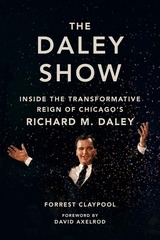
A two-time Daley chief-of-staff, Forrest Claypool draws on his long career in local government to examine the lasting successes, ongoing dramas, and disastrous failures that defined Daley’s twenty-two years in City Hall. Throughout, Claypool uses Daley’s career to illustrate how effectual political leadership relies on an adept and unapologetic use of power--and how wielding that power without challenge inevitably pulls government toward corruption.
A warts-and-all account of a pivotal figure in Chicago history, The Daley Show tells the story of how Richard M. Daley became the quintessential big city mayor.

Daniel Shays’s Honorable Rebellion: An American Story by Daniel Bullen tells the history of the crisis from the protesters’ perspective. Through five months of nonviolent protests, the farmers kept courts throughout Massachusetts from hearing foreclosures, facing down threats from the government, which escalated to the point that Governor James Bowdoin ultimately sent an army to arrest them. Even so, the people won reforms in an electoral landslide.
Thomas Jefferson called these protests an honorable rebellion, and hoped that Americans would never let twenty years pass without such a campaign, to rein in powerful interests. This riveting and meticulously researched narrative shows that Shays and his fellow protesters were hardly a dangerous rabble, but rather a proud people who banded together peaceably, risking their lives for justice in a quintessentially American story.

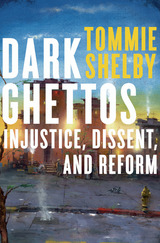
Winner of the Spitz Prize, Conference for the Study of Political Thought
Winner of the North American Society for Social Philosophy Book Award
Why do American ghettos persist? Scholars and commentators often identify some factor—such as single motherhood, joblessness, or violent street crime—as the key to solving the problem and recommend policies accordingly. But, Tommie Shelby argues, these attempts to “fix” ghettos or “help” their poor inhabitants ignore fundamental questions of justice and fail to see the urban poor as moral agents responding to injustice.
“Provocative…[Shelby] doesn’t lay out a jobs program or a housing initiative. Indeed, as he freely admits, he offers ‘no new political strategies or policy proposals.’ What he aims to do instead is both more abstract and more radical: to challenge the assumption, common to liberals and conservatives alike, that ghettos are ‘problems’ best addressed with narrowly targeted government programs or civic interventions. For Shelby, ghettos are something more troubling and less tractable: symptoms of the ‘systemic injustice’ of the United States. They represent not aberrant dysfunction but the natural workings of a deeply unfair scheme. The only real solution, in this way of thinking, is the ‘fundamental reform of the basic structure of our society.’”
—James Ryerson, New York Times Book Review
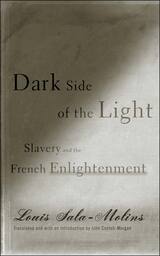
Translated into English for the first time, Dark Side of the Light scrutinizes Condorcet’s Reflections on NegroSlavery and the works of Montesquieu, Rousseau, and Diderot side by side with the Code Noir (the royal document that codified the rules of French Caribbean slavery) in order to uncover attempts to uphold the humanist project of the Enlightenment while simultaneously justifying slavery. Wielding the pen of both the ironist and the moralist, Sala-Molins demonstrates the flawed nature of these attempts and the reasons given for this denial of rights, from the imperatives of public order to the incomplete humanity of the slave (and thus the need for his progressive humanization through slavery), to the economic prosperity that depended on his labor. At the same time, Sala-Molins uses the techniques of literature to give equal weight to the perspective of the “barefooted, the starving, and the slaves” through expository prose and scenes between slave and philosopher, giving moral agency and flesh-and-blood dimensions to issues most often treated as abstractions.
Both an urgent critique and a measured analysis, Dark Side of the Light reveals the moral paradoxes of Enlightenment philosophies and their world-changing consequences.
Louis Sala-Molins is a moral and political philosopher and emeritus professor at the University of Toulouse. He is the author of many books, including Le Code Noir, ou Le calvaire de Canaan and L’Afrique aux Amériques.
John Conteh-Morgan is associate professor of French and Francophone, African-American, and African studies at Ohio State University. He is the author of Theatre and Drama in Francophone Africa: A Critical Introduction.
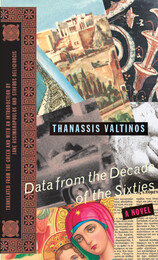
Just as Greece today struggles to adapt to a shifting political landscape, so Greece in the 1960s was convulsed by the collision of tradition and cultural transformation. In Data from the Decade of the Sixties, Valtinos assembles voices, stories, and news clips that capture the transformation of Greece, the monarchy giving way to a republic via dictatorship, the industrialization of its agricultural society, and the replacement of arranged marriages with love matches.
The many voices in this tour de force coalesce in a bricolage of documents: personal letters between friends and family, news reports, advertisements, and other written ephemera. As governments fall, sexologists, fortune-tellers, garage owners, and lonely matrons advertise their specialties and fantasies in want ads, while the young and lonely find escape within the cheap novels, movies, and gossip columns that enliven their barren existence.
Together these testimonies illuminate the tumult of 1960s Greece, where generations and values clash and Greek society struggles to adapt. Valtinos captures the pulse of a decade, portraying the spirit of the century in Greece and throughout the world.

Born in Latvia, Grace lived in seven countries and spoke five languages before the age of eleven. As a child, she witnessed Hitler’s march into Prague, attended a Soviet school during World War II, and sailed the seas with her father. In a multi-faceted career, she worked as a professional photographer, television producer, and book editor and critic. Eventually, like her father, she became a Russian specialist, but of a very different kind. She accompanied Ted Kennedy and his family to Russia, escorted Joan Baez to Moscow to meet with dissident Andrei Sakharov, and hosted Josef Stalin’s daughter on the family farm after Svetlana defected to the United States. While running her own consulting company in Russia, she witnessed the breakup of the Soviet Union, and later became director of a women’s economic empowerment project in a newly independent Ukraine.
Daughter of the Cold War is a tale of all these adventures and so much more. This compelling and evocative memoir allows readers to follow Grace's amazing path through life – a whirlwind journey of survival, risk, and self-discovery through a kaleidoscope of many countries, historic events, and fascinating people.
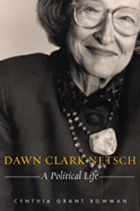
Illinois Democratic politics has recently produced the most skilled and inspirational politician in memory . . . and has also reminded us of the need for further reform. It is fitting, then, that the latest installment of the Chicago Lives series turns to Dawn Clark Netsch, a leading reformer of Illinois politics since the 1950s and the first woman major party nominee for governor of Illinois.
Netsch was a pioneer, or the first of her gender, in almost every endeavor she undertook. From the very beginning of her career, when she led the move to desegregate Northwestern University's undergraduate dorms, her passion for social justice extended beyond the rights of women to rights for racial minorities and those of all sexual orientations. Bowman charts Dawn Clark Netsch's remarkable political career, from her work behind the scenes as assistant to Governor Otto Kerner and as a participant in the 1970 Constitutional Convention to her later service in elected office, first as Illinois state senator for eighteen years and later as Illinois comptroller, and culminating in her historic run for governor in 1994. Throughout, Netsch lost neither her genteel yet unpretentious demeanor, nor her passion for progressive politics as exemplified by her early mentor, Governor Adlai E. Stevenson.
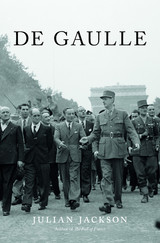
Winner of the Duff Cooper Prize
Winner of the Elizabeth Longford Prize
A New Yorker, Financial Times, Spectator, Times, and Telegraph Book of the Year
In this definitive biography of the mythic general who refused to accept the Nazi domination of France, Julian Jackson captures Charles de Gaulle as never before. Drawing on unpublished letters, memoirs, and papers from the recently opened de Gaulle archive, he shows how this volatile visionary of staunch faith and conservative beliefs infuriated Churchill, challenged American hegemony, recognized the limitations of colonial ambitions in Algeria and Vietnam, and put a broken France back at the center of world affairs.
“With a fluent style and near-total command of existing and newly available sources…Julian Jackson has come closer than anyone before him to demystifying this conservative at war with the status quo, for whom national interests were inseparable from personal honor.”
—Richard Norton Smith, Wall Street Journal
“A sweeping-yet-concise introduction to the most brilliant, infuriating, and ineffably French of men.”
—Ross Douthat, New York Times
“Classically composed and authoritative…Jackson writes wonderful political history.”
—Adam Gopnik, New Yorker
“A remarkable book in which the man widely chosen as the Greatest Frenchman is dissected, intelligently and lucidly, then put together again in an extraordinary fair-minded, highly readable portrait. Throughout, the book tells a thrilling story.”
—Antonia Fraser, New Statesman
“Makes awesome reading, and is a tribute to the fascination of its subject, and to Jackson’s mastery of it…A triumph, and hugely readable.”
—Max Hastings, Sunday Times
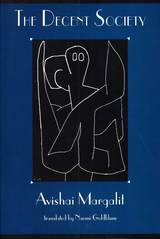
Avishai Margalit builds his social philosophy on this foundation: a decent society, or a civilized society, is one whose institutions do not humiliate the people under their authority, and whose citizens do not humiliate one another. What political philosophy needs urgently is a way that will permit us to live together without humiliation and with dignity.
Most of the philosophical attention nowadays is drawn to the ideal of the just society based on the right balance between freedom and equality. The ideal of the just society is a sublime one but hard to realize. The decent society is an ideal which can be realized even in our children's lifetime. We should get rid of cruelty first, advocated Judith Shklar. Humiliation is a close second. There is more urgency in bringing about a decent society than in bringing about a just one.
Margalit begins concretely where we live, with all the infuriating acts of humiliation that make living in the world so difficult. He argues in a concrete way in the spirit of Judith Shklar and Isaiah Berlin. This is a social philosophy that resists all those menacing labels that promote moral laziness, just as it urges us to get beyond the behavior that labels other human beings. Margalit can't be earmarked as liberal or conservative. If a label is necessary, then the most suitable is George Orwell's humane socialism, a far cry from Animal Farm socialism with its many tools of oppression. How to be decent, how to build a decent society, emerges out of Margalit's analysis of the corrosive functioning of humiliation in its many forms. This is a thoroughly argued and, what is much more, a deeply felt book that springs from Margalit's experience at the borderlands of conflicts between Eastern Europeans and Westerners, between Palestinians and Israelis.
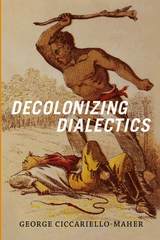
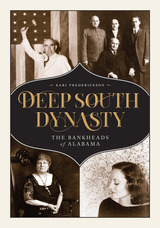
The sweeping story of an ambitious and once-powerful southern family
From Reconstruction through the end of World War II, the Bankheads served as the principal architects of the political, economic, and cultural framework of Alabama and the greater South. As a family, they were instrumental in fashioning the New South and the twentieth century American political economy, but now the Bankhead name is largely associated only with place names.
Deep South Dynasty: The Bankheads of Alabama is a deeply researched epic family biography that reflects the complicated and evolving world inhabited by three generations of the extremely accomplished—if problematic—Bankhead family of northwest Alabama. Kari Frederickson’s expertly crafted account traces the careers of five members of the family—John Hollis Bankhead; his sons, John Hollis Bankhead Jr. and William Brockman Bankhead; his daughter, Marie Bankhead Owen; and his granddaughter, Tallulah Brockman Bankhead.
A Confederate veteran and son of a slaveholder, John Hollis Bankhead held political office almost continuously from 1865 until his death in 1920, first in state-level positions and ultimately in Congress–in the House then in the Senate–for thirty-three years. Two of his three sons, John Jr. and William, followed in their father’s political footsteps. John Jr., a successful corporate attorney, was elected to the state legislature and then to the US Senate in 1930; William was elected to the House of Representatives in 1916 and chosen Speaker of the House in 1936. Together, father and sons played key roles in crafting and maintaining a conservative political culture, legal code, and economic system that facilitated economic opportunities for cotton farmers, coal barons, and emerging industries in Alabama and across the South while perpetuating White supremacy. Daughter Marie Bankhead Owen extended the family’s cultural power during her thirty-five-year tenure as director of the Alabama Department of Archives and History. From this position and through her work with groups like the United Daughters of the Confederacy, she embraced and disseminated a historical narrative steeped in Lost Cause mythology that validated the power and privilege of White elites and naturalized the second-class status of African Americans. William’s daughter, actress Tallulah Bankhead, benefited from her family’s rich political bloodlines and in turn lent them a touch of glamour and made the Bankheads modern. Frederickson’s meticulously researched examination of this once-powerful but now largely forgotten southern family is a sweeping and complex story of the region and its relationship with the wider world over the course of eight decades, from the wreckage of the Civil War to the dawn of the nuclear age.
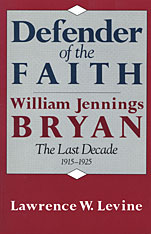
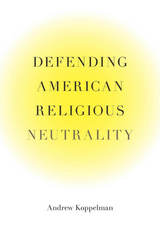
Although it is often charged with hostility toward religion, First Amendment doctrine in fact treats religion as a distinctive human good. It insists, however, that this good be understood abstractly, without the state taking sides on any theological question. Here, a leading scholar of constitutional law explains the logic of this uniquely American form of neutrality—more religion-centered than liberal theorists propose, and less overtly theistic than conservatives advocate.
The First Amendment’s guarantee of freedom of religion is under threat. Growing numbers of critics, including a near-majority of the Supreme Court, seem ready to cast aside the ideal of American religious neutrality. Andrew Koppelman defends that ideal and explains why protecting religion from political manipulation is imperative in an America of growing religious diversity.
Understanding American religious neutrality, Koppelman shows, can explain some familiar puzzles. How can Bible reading in public schools be impermissible while legislative sessions begin with prayers, Christmas is an official holiday, and the words “under God” appear in the Pledge of Allegiance? Are faith-based social services, public financing of religious schools, or the teaching of intelligent design constitutional? Combining legal, historical, and philosophical analysis, Koppelman shows how law coherently navigates these conundrums. He explains why laws must have a secular legislative purpose, why old, but not new, ceremonial acknowledgments of religion are permitted, and why it is fair to give religion special treatment.
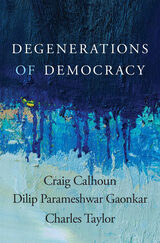
Three leading thinkers analyze the erosion of democracy’s social foundations and call for a movement to reduce inequality, strengthen inclusive solidarity, empower citizens, and reclaim pursuit of the public good.
Democracy is in trouble. Populism is a common scapegoat but not the root cause. More basic are social and economic transformations eroding the foundations of democracy, ruling elites trying to lock in their own privilege, and cultural perversions like making individualistic freedom the enemy of democracy’s other crucial ideals of equality and solidarity. In Degenerations of Democracy three of our most prominent intellectuals investigate democracy gone awry, locate our points of fracture, and suggest paths to democratic renewal.
In Charles Taylor’s phrase, democracy is a process, not an end state. Taylor documents creeping disempowerment of citizens, failures of inclusion, and widespread efforts to suppress democratic participation, and he calls for renewing community. Craig Calhoun explores the impact of disruption, inequality, and transformation in democracy’s social foundations. He reminds us that democracies depend on republican constitutions as well as popular will, and that solidarity and voice must be achieved at large scales as well as locally.
Taylor and Calhoun together examine how ideals like meritocracy and authenticity have become problems for equality and solidarity, the need for stronger articulation of the idea of public good, and the challenges of thinking big without always thinking centralization.
Dilip Parameshwar Gaonkar points out that even well-designed institutions will not integrate everyone, and inequality and precarity make matters worse. He calls for democracies to be prepared for violence and disorder at their margins—and to treat them with justice, not oppression.
The authors call for bold action building on projects like Black Lives Matter and the Green New Deal. Policy is not enough to save democracy; it will take movements.
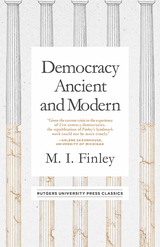
This classic study of democratic principles is thus now more relevant than ever. A renowned historian of antiquity and political philosophy, Sir M.I. Finley offers a comparative analysis of Greek and modern conceptions of democracy. As he puts the ancient Greeks in dialogue with their contemporary counterparts, Finley tackles some of the most pressing issues of our day, including public apathy, partisanship, consensus politics, distrust of professional politicians, and the limits of free speech.
Including three lectures that Finley delivered at Rutgers University, plus two additional essays that further illuminate his thinking, Democracy Ancient and Modern explores the dramatic differences between the close-knit civil society of the ancient Greeks and our own atomized mass societies. By mapping out democracy’s past and its present manifestations, this book helps us plot a course for democracy’s future.
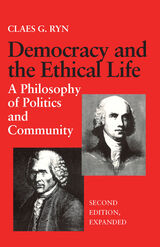
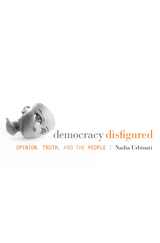
In Democracy Disfigured, Nadia Urbinati diagnoses the ills that beset the body politic in an age of hyper-partisanship and media monopolies and offers a spirited defense of the messy compromises and contentious outcomes that define democracy.
Urbinati identifies three types of democratic disfiguration: the unpolitical, the populist, and the plebiscitarian. Each undermines a crucial division that a well-functioning democracy must preserve: the wall separating the free forum of public opinion from the governmental institutions that enact the will of the people. Unpolitical democracy delegitimizes political opinion in favor of expertise. Populist democracy radically polarizes the public forum in which opinion is debated. And plebiscitary democracy overvalues the aesthetic and nonrational aspects of opinion. For Urbinati, democracy entails a permanent struggle to make visible the issues that citizens deem central to their lives. Opinion is thus a form of action as important as the mechanisms that organize votes and mobilize decisions.
Urbinati focuses less on the overt enemies of democracy than on those who pose as its friends: technocrats wedded to procedure, demagogues who make glib appeals to “the people,” and media operatives who, given their preference, would turn governance into a spectator sport and citizens into fans of opposing teams.
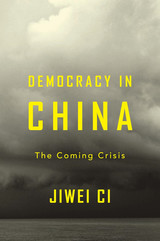
A respected Chinese political philosopher calls for the Communist Party to take the lead in moving China along the path to democracy before it is too late.
With Xi Jinping potentially set as president for life, China’s move toward political democracy may appear stalled. But Jiwei Ci argues that four decades of reform have created a mentality in the Chinese people that is just waiting for the political system to catch up, resulting in a disjunction between popular expectations and political realities. The inherent tensions in a largely democratic society without a democratic political system will trigger an unprecedented crisis of legitimacy, forcing the Communist Party to act or die.
Two crises loom for the government. First is the waning of the Communist Party’s revolutionary legacy, which the party itself sees as a grave threat. Second is the fragility of the next leadership transition. No amount of economic success will compensate for the party’s legitimacy deficit when the time comes. The only effective response, Ci argues, will be an orderly transition to democracy. To that end, the Chinese government needs to start priming its citizens for democracy, preparing them for new civil rights and civic responsibilities. Embracing this pragmatic role offers the Communist Party a chance to survive. Its leaders therefore have good reason to initiate democratic change.
Sure to challenge the Communist Party and stir debate, Democracy in China brings an original and important voice to an issue with far-reaching consequences for China and the world.
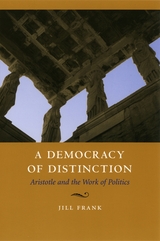
Moving back and forth between Aristotle's writings and contemporary legal and political theory, Frank breathes new life into our conceptions of property, justice, and law by viewing them not only as institutions but as dynamic activities as well. Frank's innovative approach to Aristotle stresses his appreciation of the tensions and complexities of politics so that we might rethink and reorganize our own political ideas and practices. A Democracy of Distinction will be of enormous value to classicists, political scientists, and anyone interested in revitalizing democratic theory and practice.
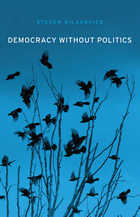
In Western democracies today, politics and politicians are held in contempt by the majority of citizens. Steven Bilakovics argues that this disdain of politics follows neither from the discontents of our liberal political system nor from the preoccupations of a consumer society. Rather, extending Tocqueville’s analysis of the modern democratic way of life, he traces the sources of political cynicism to democracy itself.
Democratic society’s defining openness—its promise of transcendent freedom and unlimited power—renders the everyday politics of argument and persuasion absurd by comparison. Persuasion is devalued relative to the norms of free-market competition and patriotic community, assertions of self-interest and self-expression take the place of arguing together, and political life is diminished by the absence of mediating talk. Bilakovics identifies this trend across the political landscape—in the clashing authenticities of the "culture war," the perennial pursuit of the political outsider to set things right again, the call for a postpartisan politics, rising demands on government alongside falling expectations of what government can do, and in a political rhetoric that is at once petty and hyperbolic. To reform democratic politics and ameliorate its pathologies, Bilakovics calls on us to overcome our anti-political prejudice and rethink robust democracy as the citizen's practice of persuading and being persuaded in turn.
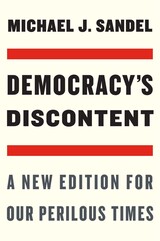
A renowned political philosopher updates his classic book on the American political tradition to address the perils democracy confronts today.
The 1990s were a heady time. The Cold War had ended, and America’s version of liberal capitalism seemed triumphant. And yet, amid the peace and prosperity, anxieties about the project of self-government could be glimpsed beneath the surface.
So argued Michael Sandel, in his influential and widely debated book Democracy’s Discontent, published in 1996. The market faith was eroding the common life. A rising sense of disempowerment was likely to provoke backlash, he wrote, from those who would “shore up borders, harden the distinction between insiders and outsiders, and promise a politics to ‘take back our culture and take back our country,’ to ‘restore our sovereignty’ with a vengeance.”
Now, a quarter century later, Sandel updates his classic work for an age when democracy’s discontent has hardened into a country divided against itself. In this new edition, he extends his account of America’s civic struggles from the 1990s to the present. He shows how Democrats and Republicans alike embraced a version of finance-driven globalization that created a society of winners and losers and fueled the toxic politics of our time.
In a work celebrated when first published as “a remarkable fusion of philosophical and historical scholarship” (Alan Brinkley), Sandel recalls moments in the American past when the country found ways to hold economic power to democratic account. To reinvigorate democracy, Sandel argues in a stirring new epilogue, we need to reconfigure the economy and empower citizens as participants in a shared public life.
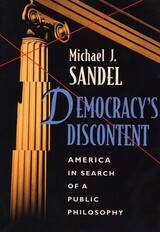
The defect, Sandel maintains, lies in the impoverished vision of citizenship and community shared by Democrats and Republicans alike. American politics has lost its civic voice, leaving both liberals and conservatives unable to inspire the sense of community and civic engagement that self-government requires.
In search of a public philosophy adequate to our time, Sandel ranges across the American political experience, recalling the arguments of Jefferson and Hamilton, Lincoln and Douglas, Holmes and Brandeis, FDR and Reagan. He relates epic debates over slavery and industrial capitalism to contemporary controversies over the welfare state, religion, abortion, gay rights, and hate speech. Democracy's Discontent provides a new interpretation of the American political and constitutional tradition that offers hope of rejuvenating our civic life.
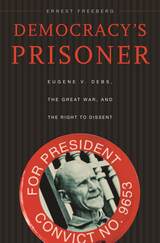
In 1920, socialist leader Eugene V. Debs ran for president while serving a ten-year jail term for speaking against America’s role in World War I. Though many called Debs a traitor, others praised him as a prisoner of conscience, a martyr to the cause of free speech. Nearly a million Americans agreed, voting for a man whom the government had branded an enemy to his country.
In a beautifully crafted narrative, Ernest Freeberg shows that the campaign to send Debs from an Atlanta jailhouse to the White House was part of a wider national debate over the right to free speech in wartime. Debs was one of thousands of Americans arrested for speaking his mind during the war, while government censors were silencing dozens of newspapers and magazines. When peace was restored, however, a nationwide protest was unleashed against the government’s repression, demanding amnesty for Debs and his fellow political prisoners. Led by a coalition of the country’s most important intellectuals, writers, and labor leaders, this protest not only liberated Debs, but also launched the American Civil Liberties Union and changed the course of free speech in wartime.
The Debs case illuminates our own struggle to define the boundaries of permissible dissent as we continue to balance the right of free speech with the demands of national security. In this memorable story of democracy on trial, Freeberg excavates an extraordinary episode in the history of one of America’s most prized ideals.
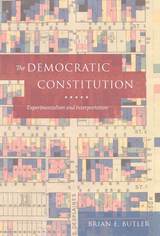
Butler offers an alternative democratic conception of constitutional law, “democratic experimentalism,” and applies it in a thorough reconstruction of Supreme Court cases across the centuries, such as Brown v. Board of Education, Citizens United v. Federal Election Commission, Lucas v. South Carolina Coastal Council, and Lochner v. New York. In contrast to the traditional tools and conceptions of legal analysis that see the law as a formally unique and separate type of practice, democratic experimentalism combines democratic aims and experimental practice. Butler also suggests other directions jurisprudential roles could take: for example, adjudication could be performed by primary stakeholders with better information. Ultimately, Butler argues persuasively for a move away from the current absolute centrality of courts toward a system of justice that emphasizes local rule and democratic choice.
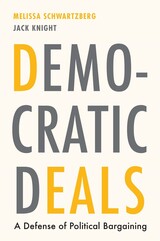
Two leading scholars of democracy make the case for political bargaining and define its proper limits.
Bargains—grand and prosaic—are a central fact of political life. The distribution of bargaining power affects the design of constitutions, the construction of party coalitions, legislative outcomes, judicial opinions, and much more. But can political bargaining be justified in theory? If it inevitably involves asymmetric power, is it anything more than the exercise of sublimated force, emerging from and reifying inequalities?
In Democratic Deals, Melissa Schwartzberg and Jack Knight defend bargaining against those who champion deliberation or compromise, showing that, under the right conditions and constraints, it can secure political equality and protect fundamental interests. The challenge, then, is to ensure that these conditions prevail. Drawing a sustained analogy to the private law of contracts—in particular, its concepts of duress and unconscionability—the authors articulate a set of procedural and substantive constraints on the bargaining process and analyze the circumstances under which unequal bargaining power might be justified in a democratic context. Institutions, Schwartzberg and Knight argue, can facilitate gains from exchange while placing meaningful limits on the exercise of unequal power.
Democratic Deals examines frameworks of just bargaining in a range of contexts—constitution-making and legislative politics, among judges and administrative agencies, across branches of government, and between the state and private actors in the course of plea deals. Bargaining is an ineradicable fact of political life. Schwartzberg and Knight show that it can also be essential for democracy.
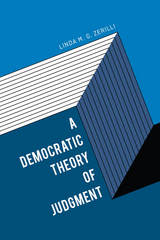
Zerilli deftly outlines the limitations of existing debates, both those that concern themselves with the impossibility of judging across cultures and those that try to find transcendental, rational values to anchor judgment. Looking at Kant through the lens of Arendt, Zerilli develops the notion of a public conception of truth, and from there she explores relativism, historicism, and universalism as they shape feminist approaches to judgment. Following Arendt even further, Zerilli arrives at a hopeful new pathway—seeing the collapse of philosophical criteria for judgment not as a problem but a way to practice judgment anew as a world-building activity of democratic citizens. The result is an astonishing theoretical argument that travels through—and goes beyond—some of the most important political thought of the modern period.
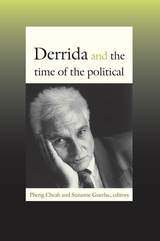
The volume opens with a substantial introduction in which Pheng Cheah and Suzanne Guerlac survey Derrida’s entire corpus and position his later work in relation to it. The remaining essays address the concerns that arise out of Derrida’s analysis of politics and the conditions of the political, such as the meaning and scope of democracy, the limits of sovereignty, the relationship between the ethical and the political, the nature of responsibility, the possibility for committed political action, the implications of deconstructive thought for non-Western politics, and the future of nationalism in an era of globalization and declining state sovereignty. The collection is framed by original contributions from Hélène Cixous and Judith Butler.
Contributors. Étienne Balibar, Geoffrey Bennington, Wendy Brown, Judith Butler, Pheng Cheah, Hélène Cixous, Rodolphe Gasché, Suzanne Guerlac, Marcel Hénaff, Martin Jay, Anne Norton, Jacques Rancière, Soraya Tlatli, Satoshi Ukai

Jacques Derrida and Jürgen Habermas have long represented opposite camps in contemporary thought. Derrida, who pioneered the intellectual style of inquiry known as deconstruction, ushered in the postmodern age with his dramatic critique of reason; Habermas, on the other hand, has consistently argued in defense of reason, modernity, and the legacy of the Enlightenment. Their many differences led to a long-standing, if scattered, dialogue, evidence of which has been available in only bits and pieces. But now, for the first time, TheDerrida-Habermas Reader brings these pieces together, along with a collection of essays documenting the intellectual relationship between two of the twentieth century’s preeminent thinkers.
Taken together, Derrida and Habermas’s writings—combined here with contributions by other prominent philosophers and social theorists—tell the story of the two thinkers’ provocative engagement with each other’s ideas. Beyond exploring the conflict between Derrida’s deconstruction and Habermas’s communicative rationality, they show how the Derrida-Habermas encounter changed over the years, becoming more theoretically productive without ever collapsing into mutual rejection or simple compromise.
Lasse Thomassen has divided the essays—including works on philosophy and literature, ethics, politics, and international law—into four parts that cover the full range of thought in which Derrida and Habermas engaged. The last of these sections fittingly includes the thinkers’ jointly signed work on European solidarity and the Iraq War, highlighting the hopes they held in common despite their differences. The wide breadth of this book, along with Thomassen’s lucid introductions to each section, makes The Derrida-Habermas Reader an ideal starting point for anyone interested in one of the most dynamic intellectual debates of our time.
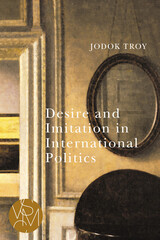
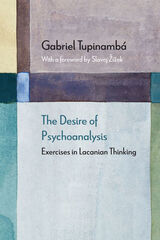
The Desire of Psychoanalysis proposes that recognizing how certain theoretical and institutional problems in Lacanian psychoanalysis are grounded in the historical conditions of Lacan’s own thinking might allow us to overcome these impasses. In order to accomplish this, Gabriel Tupinambá analyzes the socioeconomic practices that underlie the current institutional existence of the Lacanian community—its political position as well as its institutional history—in relation to theoretical production.
By focusing on the underlying dynamic that binds clinical practice, theoretical work, and institutional security in Lacanian psychoanalysis today, Tupinambá is able to locate sites for conceptual innovation that have been ignored by the discipline, such as the understanding of the role of money in clinical practice, the place of analysands in the transformation of psychoanalytic theory, and ideological dead-ends that have become common sense in the Lacanian field. The Desire of Psychoanalysis thus suggests ways of opening up psychoanalysis to new concepts and clinical practices and calls for a transformation of how psychoanalysis is understood as an institution.

Download PDF of corrected version of Chapter 2The intrinsic links between economics and human rights has led some scholars and practitioners to affirm that if strategies of economic development and policies to implement human rights are united, they will reinforce one another and improve the human condition.
This book draws on the papers presented at the Nobel Symposium on The Right to Development and Human Rights in Development. Opening with an essay by Nobel Laureate Amartya Sen, the book contains chapters by experts in the fields of philosophy, economics, international law, and international relations on the conceptual underpinnings of development as a human right, the national dimensions of this right, and the role of international institutions. The contributors explore the meaning and practical implications of human rights-based approaches to economic development and ask what this relationship may add to our understanding and thinking about human and global development.

"Hobbes students are indebted to Professor Cropsey for this scholarly and accessible edition of Dialogue."—J. Roland Pennock, American Political Science Review
"An invaluable aid to the study of Hobbes."—Review of Metaphysics
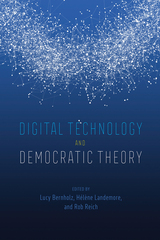
To understand these transformations, this book brings together contributions by scholars from multiple disciplines to wrestle with the question of how digital technologies shape, reshape, and affect fundamental questions about democracy and democratic theory. As expectations have whiplashed—from Twitter optimism in the wake of the Arab Spring to Facebook pessimism in the wake of the 2016 US election—the time is ripe for a more sober and long-term assessment. How should we take stock of digital technologies and their promise and peril for reshaping democratic societies and institutions? To answer, this volume broaches the most pressing technological changes and issues facing democracy as a philosophy and an institution.
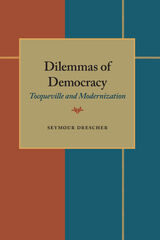

In 1987, the city of Chicago hired a former radical college chaplain to clean up rampant corruption on the waterfront. R. J. Nelson thought he was used to the darker side of the law—he had been followed by federal agents and wiretapped due to his antiwar stances in the sixties—but nothing could prepare him for the wretched bog that constituted the world of a Harbor Boss. Dirty Waters is the wry, no-holds-barred memoir of Nelson’s time controlling some of the city’s most beautiful spots while facing some of its ugliest traditions. Nelson takes us through Chicago's beloved “blue spaces” and deep into the city’s political morass, revealing the different moralities underlining three mayoral administrations and navigating the gritty mechanisms of the city’s political machine. Ultimately, Dirty Waters is a tale of morality, of what it takes to be a force for good in the world and what struggles come from trying to stay ethically afloat in a sea of corruption.
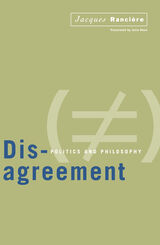
“Is there any such thing as political philosophy?” So begins this provocative book by one of the foremost figures in Continental thought. Here, Jacques Rancière brings a new and highly useful set of terms to the vexed debate about political effectiveness and “the end of politics.”
What precisely is at stake in the relationship between “philosophy” and the adjective “political”? In Disagreement, Rancière explores the apparent contradiction between these terms and reveals the uneasy meaning of their union in the phrase “political philosophy”—a juncture related to age-old attempts in philosophy to answer Plato’s devaluing of politics as a “democratic egalitarian” process.
According to Rancière, the phrase also expresses the paradox of politics itself: the absence of a proper foundation. Politics, he argues, begins when the “demos” (the “excessive” or unrepresented part of society) seeks to disrupt the order of domination and distribution of goods “naturalized” by police and legal institutions. In addition, the notion of “equality” operates as a game of contestation that constantly substitutes litigation for political action and community. This game, Rancière maintains, operates by a primary logic of “misunderstanding.” In turn, political philosophy has always tried to substitute the “politics of truth” for the politics of appearances.
Disagreement investigates the various transformations of this regime of “truth” and their effects on practical politics. Rancière then distinguishes what we mean by “democracy” from the practices of a consensual system in order to unravel the ramifications of the fashionable phrase “the end of politics.” His conclusions will be of interest to readers concerned with political questions from the broadest to the most specific and local.
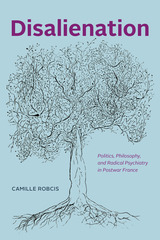
In Disalienation, Camille Robcis grapples with the historical, intellectual, and psychiatric meaning of the ethics articulated at Saint-Alban by exploring the movement’s key thinkers, including François Tosquelles, Frantz Fanon, Félix Guattari, and Michel Foucault. Anchored in the history of one hospital, Robcis's study draws on a wide geographic context—revolutionary Spain, occupied France, colonial Algeria, and beyond—and charts the movement's place within a broad political-economic landscape, from fascism to Stalinism to postwar capitalism.

These lectures—carefully edited and including notes and introductory material to fully illuminate Foucault’s insights—are a major addition to Foucault’s English language corpus.

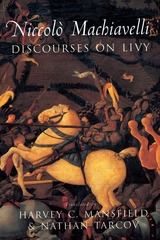
"[Machiavelli] found in Livy the means to inspire scholars for five centuries. Within the Discourses, often hidden and sometimes unintended by their author, lie the seeds of modern political thought. . . . [Mansfield and Tarcov's] translation is careful and idiomatic."—Peter Stothard, The Times
"Translated with painstaking accuracy—but also great readability."—Weekly Standard
"A model of contemporary scholarship and a brave effort at Machiavelli translation that allows the great Florentine to speak in his own voice."—Choice
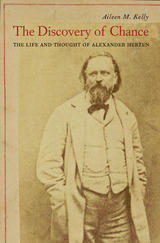
Alexander Herzen—philosopher, novelist, essayist, political agitator, and one of the leading Russian intellectuals of the nineteenth century—was as famous in his day as Tolstoy and Dostoevsky. While he is remembered for his masterpiece My Past and Thoughts and as the father of Russian socialism, his contributions to the history of ideas defy easy categorization because they are so numerous. Aileen Kelly presents the first fully rounded study of the farsighted genius whom Isaiah Berlin called “the forerunner of much twentieth-century thought.”
In an era dominated by ideologies of human progress, Herzen resisted them because they conflicted with his sense of reality, a sense honed by his unusually comprehensive understanding of history, philosophy, and the natural sciences. Following his unconventional decision to study science at university, he came to recognize the implications of early evolutionary theory, not just for the natural world but for human history. In this respect, he was a Darwinian even before Darwin.
Socialism for Russia, as Herzen conceived it, was not an ideology—least of all Marxian “scientific socialism”—but a concrete means of grappling with unique historical circumstances, a way for Russians to combine the best of Western achievements with the possibilities of their own cultural milieu in order to move forward. In the same year that Marx declared communism to be the “solution to the riddle of history,” Herzen denied that any such solution could exist. History, like nature, was contingent—an improvisation both constrained and encouraged by chance.

Prominent observers complain that public discourse in America is shallow and unedifying. This debased condition is often attributed to, among other things, the resurgence of religion in public life. Steven Smith argues that this diagnosis has the matter backwards: it is not primarily religion but rather the strictures of secular rationalism that have drained our modern discourse of force and authenticity.
Thus, Rawlsian “public reason” filters appeals to religion or other “comprehensive doctrines” out of public deliberation. But these restrictions have the effect of excluding our deepest normative commitments, virtually assuring that the discourse will be shallow. Furthermore, because we cannot defend our normative positions without resorting to convictions that secular discourse deems inadmissible, we are frequently forced to smuggle in those convictions under the guise of benign notions such as freedom or equality.
Smith suggests that this sort of smuggling is pervasive in modern secular discourse. He shows this by considering a series of controversial, contemporary issues, including the Supreme Court’s assisted-suicide decisions, the “harm principle,” separation of church and state, and freedom of conscience. He concludes by suggesting that it is possible and desirable to free public discourse of the constraints associated with secularism and “public reason.”
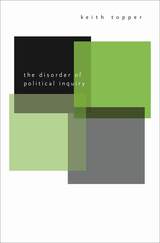
In the past several years two academic controversies have migrated from the classrooms and courtyards of college and university campuses to the front pages of national and international newspapers: Alan Sokal’s hoax, published in the journal Social Text, and the self-named movement, “Perestroika,” that recently emerged within the discipline of political science. Representing radically different analytical perspectives, these two incidents provoked wide controversy precisely because they brought into sharp relief a public crisis in the social sciences today, one that raises troubling questions about the relationship between science and political knowledge, and about the nature of objectivity, truth, and meaningful inquiry in the social sciences. In this provocative and timely book, Keith Topper investigates the key questions raised by these and other interventions in the “social science wars” and offers unique solutions to them.
Engaging the work of thinkers such as Richard Rorty, Charles Taylor, Pierre Bourdieu, Roy Bhaskar, and Hannah Arendt, as well as recent literature in political science and the history and philosophy of science, Topper proposes a pluralist, normative, and broadly pragmatist conception of political inquiry, one that is analytically rigorous yet alive to the notorious vagaries, idiosyncrasies, and messy uncertainties of political life.

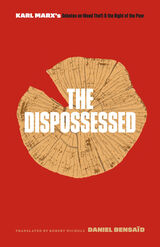
Excavating Marx’s early writings to rethink the rights of the poor and the idea of the commons in an era of unprecedented privatization
The politics of dispossession are everywhere. Troubling developments in intellectual property, genomics, and biotechnology are undermining established concepts of property, while land appropriation and ecological crises reconfigure basic institutions of ownership. In The Dispossessed, Daniel Bensaïd examines Karl Marx’s early writings to establish a new framework for addressing the rights of the poor, the idea of the commons, and private property as a social institution.
In his series of articles from 1842–43 about Rhineland parliamentary debates over the privatization of public lands and criminalization of poverty under the rubric of the “theft of wood,” Marx identified broader anxieties about customary law, property rights, and capitalist efforts to privatize the commons. Bensaïd studies these writings to interrogate how dispossession continues to function today as a key modality of power. Brilliantly tacking between past and present, The Dispossessed discloses continuity and rupture in our relationships to property and, through that, to one another.
In addition to Bensaïd’s prescient work of political philosophy, The Dispossessed includes new translations of Marx’s original “theft of wood” articles and an introductory essay by Robert Nichols that lucidly contextualizes the essays.
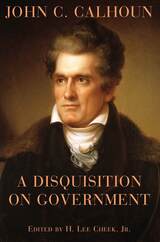
This volume provides the most economical and textually accurate version of Calhoun’s Disquisition available today. As a treatise, the Disquisition is one of the greatest and most enduring works of American politial thought, and a text of seminal importance to all students of American politics, history, philosophy, and law. In the Disquisition, Calhoun believed he had laid a “solid foundation for political science” through revitalizing popular rule. To complete his theoretical and practical mission, Calhoun attempts to explain the best example of the diffusion of authority and cultivation of liberty: the American Constitution. The fundamental law of the American republic provided, after all, the “interior structure” for regulating the shape and scope of government. As a guide for the states and the general government, the Constitution was also part of the “organism” that limited the centralization of authority and allowed for genuine popular rule; and it was Calhoun’s exposition of the connection between the moral demands of a properly constituted concept of popular rule and the need for practical ordering principles that is articulated in this book.
Calhoun presents a theory of politics that is both original and in accord with the mainstream of the American political tradition. More than any other thinker of his period, Calhoun sought to explain the enduring qualities of American political thought in light of the troubled world of the mid-nineteenth century. Unlike other theorists who had preceded and would follow Calhoun, both American and European, he did not seek to invent a new mode of philosophical speculation or a “grand theory” for the human sciences. Instead, he attempted to offer a refinement of classical, medieval, and modern notions regarding the relationship between government and the social order. As an effort in philosophical retrenchment, the Disquisition strengthened many pre-existing conceptions regarding political liberty and popular rule within the American regime, while offering such insight with a view toward the future that awaited America. Calhoun’s attempt in the Disquisition to reconcile the good of popular rule with ethical requirements have singular relevance to the many nations in the twenty-first century now engaged, despite the ethnic animosities threatening their destruction, in building post-ideological, civilized political and social orders, especially the peoples of Central and Eastern Europe, Russia, and Africa.
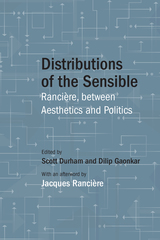
Distributions of the Sensible contains original essays by leading scholars on topics such as Rancière’s relation to political theory, critical theory, philosophical aesthetics, and film. The book concludes with a new essay by Rancière himself that reconsiders the practice of theory between aesthetics and politics.
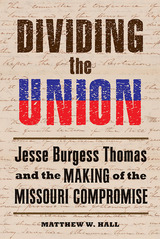
In 1820 the Missouri controversy erupted over the issue of slavery in the newly acquired lands of the Louisiana Purchase. It fell to Jesse Burgess Thomas (1777–1853), a junior U.S. senator from the new state of Illinois, to handle the delicate negotiations that led to the Missouri Compromise. Thomas’s maturity, good judgment, and restraint helped pull the country back from the brink of disunion and created a compromise that held for thirty-four years. In Dividing the Union, Matthew W. Hall examines the legal issues underlying the controversy and the legislative history of the Missouri Compromise while focusing on the aspects of Thomas’s life and character that gave him such influence. The first in-depth biography of Thomas, Hall’s work demonstrates how the legislative battle over the Compromise reflected the underlying nuances of the larger struggle over slavery.
The text of the Missouri Compromise originated from the Northwest Ordinance. Article VI of the Ordinance purported to prohibit slavery in the Northwest Territory, but paradoxically, a provision that assured property rights in another article was used to protect slavery. People in some parts of the Northwest sought to circumvent Article VI by formulating indenture laws and various state constitutional provisions addressing slavery. Pro- and antislavery activists eventually developed quite different interpretations of the relevant language in these documents, making negotiations over slavery in the new territory extremely complicated.
As Hall demonstrates, Thomas was perfectly situated geographically, politically, and ideologically to navigate the Missouri controversy. He was the first speaker of the Indiana Territorial General Assembly, one of the first territorial judges in the Illinois Territory, and the president of the Illinois State Constitutional Convention in 1818. Because the drive for statehood in Illinois was strong, the convention managed to skirt the divisive issue of slavery, due in large part to Thomas’s efforts. That he was never required to clearly articulate his own views on slavery allowed Thomas to maintain a degree of neutrality, and his varied political career gave him the experience necessary to craft a compromise.
Thomas’s final version of the Compromise included shrewdly worded ambiguities that supported opposing interests in the matter of slavery. These ambiguities secured the passage of the Compromise and its endurance until the Kansas-Nebraska Act of 1854. By weaving Thomas’s life story into the history of the Missouri Compromise, Hall offers new insight into both a pivotal piece of legislation and an important, previously overlooked figure in nineteenth-century American politics.
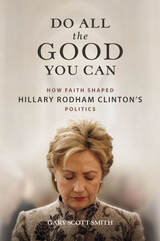
Methodism in the public and private lives of the politician
After more than forty contentious years in the public eye, Hillary Rodham Clinton is one of the best-known political figures in the nation. Yet the strong religious faith at the heart of her politics and personal life often remains confounding, if not mysterious, to longtime observers. Even many of her admirers would be surprised to hear Clinton state that her Methodist outlook has “been a huge part of who I am and how I have seen the world, and what I believe in, and what I have tried to do in my life.”
Gary Scott Smith’s biography of Clinton’s journey in faith begins with her Methodist upbringing in Park Ridge, Illinois, where she faithfully attended worship services, Sunday school, and youth group meetings. Like many mainline Protestants, Clinton’s spiritual commitment developed gradually throughout childhood, while her combination of missionary zeal and impressive personal talents has informed her career from the time of her pro bono work at Yale on behalf of children to the present.
Her Methodist faith has been very important to many of Clinton’s high-profile endeavors and in helping her cope with the prominent travails brought on by two presidential campaigns, never-ending conservative rancor, and her husband’s infidelity. Smith’s account examines Clinton’s faith in the context of work ranging from her 1990s pursuit of healthcare reform to a “Hillary doctrine” of foreign policy focused on her longtime goal of providing basic human rights for children and women--a project she saw as essential to United States security. The result is an enlightening reconsideration of an extraordinary political figure who has defied private doubts and public controversy to live by John Wesley’s dictum: “Do all the good you can, by all the means you can, in all the ways you can, in all the places you can, at all the times you can, to all the people you can, as long as ever you can.”

Hatim Kanaaneh is a Palestinian doctor who has struggled for over 35 years to bring medical care to Palestinians in Galilee, against a culture of anti-Arab discrimination. This is the story of how he fought for the human rights of his patients and overcame the Israeli authorities' cruel indifference to their suffering.
Kanaaneh is a native of Galilee, born before the creation of Israel. He left to study medicine at Harvard, before returning to work as a public health physician with the intention of helping his own people. He discovered a shocking level of disease and malnutrition in his community and a shameful lack of support from the Israeli authorities. After doing all he could for his patients by working from inside the system, Kanaaneh set up The Galilee Society, an NGO working for equitable health, environmental and socio-economic conditions for Palestinian Arabs in Israel.
This is a brilliant memoir that shows how grass roots organisations can loosen the Zionist grip upon Palestinian lives.
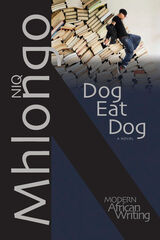



While pursuing a race for district prosecutor in the 1970s, Glasgow had run afoul of the local political machine. The machine later decided to teach Glasgow a lesson even though he’d lost the race. Down and Dirty Down South is Glasgow’s story of how he attempted to clear his name and also track down the people who had set him up for charges of smuggling illegal drugs into the United States.


Italian doctor Leonardo Pazzi and Alcesta, his “future lover,” travel through the picturesque, hilly region of Sloboda, near Kharkiv in northeast Ukraine. They experience a series of encounters with local Ukrainians and nature, disappearances, and transformations filled with paradoxes. The characters are bright, marionette-like caricatures whom the author constructs and moves ostentatiously in full view of the reader, revealing his artistic devices with a sense of absurd, mischievous humor.
A novel of exuberance and whim that deconstructs the very principles of writing and estranges everyday phenomena, Dr. Leonardo’s Journey marks the highpoint of Ukrainian modernism right before it was violently cut down by Stalin’s repressions. The novel shifts away from character or plot as such and instead celebrates the places and spaces in which these things come into being, and the sheer joy of movement and experience. In this sense, Maik Yohansen’s heroes echo Mykola Hohol, whose tour through Russia’s vast spaces in Nikolai Gogol’s Dead Souls is an obvious reference point, and Laurence Sterne, whose irreverent narrative style and textual games Yohansen emulates. Presented here in a contemporary, deft English translation, the novel is a must read for everyone interested in discovering the rich heritage of Ukrainian modernism.

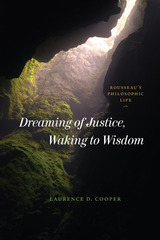
Dreaming of Justice, Waking to Wisdom reveals what could be thought of as the capstone of Rousseau’s thought, even if that capstone has been nearly invisible to readers. Despite criticizing philosophy for its corrosive effects on both natural goodness and civic virtue, Rousseau, argues Laurence D. Cooper, held the philosophic life as an ideal. Cooper expertly unpacks Rousseau’s vivid depiction of the philosophic life and the case for that life as the most natural, the freest, or, in short, the best or most choice-worthy of lives. Cooper focuses especially on a single feature, arguably the defining feature of the philosophic life: the overcoming of the ordinary moral consciousness in favor of the cognitivist view of morality. Cooper shows that Rousseau, with his particular understanding and embrace of the philosophic life, proves to be a kind of latter-day Socratic. Thorough and thought-provoking, Dreaming of Justice, Waking to Wisdom provides vital insight into Rousseau.
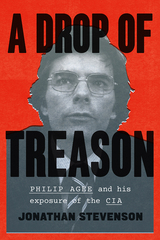
The first biography of this contentious, legendary man, Jonathan Stevenson’s A Drop of Treason is a thorough portrait of Agee and his place in the history of American foreign policy and the intelligence community during the Cold War and beyond. Unlike mere whistleblowers, Agee exposed American spies by publicly blowing their covers. And he didn’t stop there—his was a lifelong political struggle that firmly allied him with the social movements of the global left and against the American project itself from the early 1970s on. Stevenson examines Agee’s decision to turn, how he sustained it, and how his actions intersected with world events.
Having made profound betrayals and questionable decisions, Agee lived a rollicking, existentially fraught life filled with risk. He traveled the world, enlisted Gabriel García Márquez in his cause, married a ballerina, and fought for what he believed was right. Raised a conservative Jesuit in Tampa, he died a socialist expat in Havana. In A Drop of Treason, Stevenson reveals what made Agee tick—and what made him run.
READERS
Browse our collection.
PUBLISHERS
See BiblioVault's publisher services.
STUDENT SERVICES
Files for college accessibility offices.
UChicago Accessibility Resources
home | accessibility | search | about | contact us
BiblioVault ® 2001 - 2024
The University of Chicago Press









